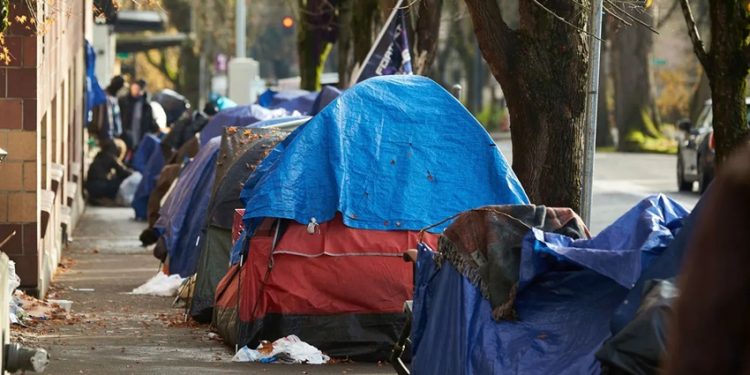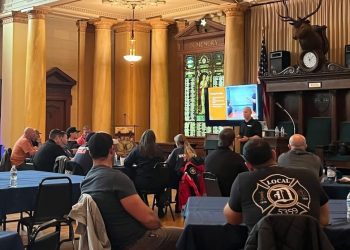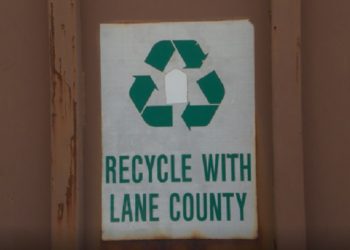Astoria, OR – As Oregon grapples with an ongoing housing crisis, city officials are calling for more power to clear homeless camps, citing public safety and health concerns. At the heart of the debate is a 2021 law that they argue restricts their ability to effectively address the issue. The League of Oregon Cities, which represents local governments, has made changing this law one of its top priorities for the 2025 legislative session.
The law in question, House Bill 3115, was championed by then-legislator Tina Kotek, now Oregon’s governor, and was designed to align state policies with federal rulings that protected homeless individuals from being penalized for camping in public spaces unless shelter was available. Under the law, cities are restricted from enforcing camping bans unless the policies are deemed “objectively reasonable,” a term that was left undefined, adding ambiguity to its interpretation.
The League of Oregon Cities argues that this legal framework limits their ability to address dangerous or unsanitary conditions in encampments. They are pushing for a clearer definition of what is “objectively reasonable” and for greater flexibility to enforce camping bans in specific locations, such as near schools or in high-traffic public spaces. By changing the law, they say, local governments would have the tools needed to address what they describe as unsafe and unsanitary conditions, safeguarding public spaces, and protecting the health, safety, and well-being of all community members.
“We believe cities should have the authority to protect their citizens from dangerous camping situations,” said Alexandra Ring, a lobbyist for the League of Oregon Cities. “We want to balance the needs of our communities with a humane approach to addressing homelessness.”
This push has found supporters on both sides of the political aisle. Democratic Senator Mark Meek of Oregon City, for example, has drafted a bill that would repeal the provisions of the 2021 law, arguing that the current state policy excessively limits local governments’ ability to determine how best to manage homelessness in their jurisdictions. Meek and other lawmakers signed a letter earlier this year urging legislative leaders to reconsider the law in light of a U.S. Supreme Court ruling that provided broader leeway to cities in regulating homeless encampments.
However, the proposed changes face significant opposition from homeless advocates, who warn that rolling back the 2021 law will exacerbate the already dire situation for people living without shelter. Sybil Hebb, the director of legislative advocacy at the Oregon Law Center, which represents homeless residents, argued that the focus should be on building more affordable housing, not on expanding cities’ power to sweep camps.
“Anything that detracts from building permanent housing solutions for our homeless population is a setback,” Hebb said. “Our clients include survivors of domestic violence, seniors, and families with children — all of whom will be disproportionately affected by harsher camping policies.”
The Oregon Law Center, along with other advocacy groups, has criticized the notion that clearing camps will effectively solve the homelessness crisis. They point out that many individuals who live in encampments have no other options, as shelter space is often limited, and affordable housing is in short supply.
“Homelessness is a complex issue that needs a multifaceted solution. Increasing police power to clear camps is not a solution; it’s a band-aid that doesn’t address the underlying issues,” Hebb added.
The debate over the 2021 law comes as cities across the U.S. are reexamining their homeless camping policies. Oregon’s law, despite its restrictions, has not prevented cities from taking action. Portland, for example, continues to clear camps regularly, but the process has been slowed by legal challenges from advocacy groups who argue that such sweeps violate the rights of homeless individuals.
Portland Mayor Ted Wheeler’s administration, which has dealt with several legal battles over anti-camping policies, recently modified its approach after a lawsuit challenged the city’s attempts to ban camping in certain public spaces during the day. The revised policy allows for more flexibility but still faces opposition from groups that say it does not go far enough to protect homeless individuals.
The League of Oregon Cities, while seeking changes to the law, has expressed a desire to avoid hasty decisions. “We are very aware of the sensitivity of this issue,” Ring said. “Our goal is to find a balanced solution that addresses the needs of both homeless individuals and the broader public.”
However, not all cities within the League are on board with proposed changes. Portland Mayor-elect Keith Wilson, who campaigned on a platform of ending unsheltered homelessness, has made it clear that he does not support rolling back the 2021 law. Wilson’s office issued a statement saying that he plans to focus on providing more shelter options and services for homeless individuals rather than pursuing changes to state law. “I believe we can work within the current law to end camping in our public spaces. Our intent is not to criminalize homelessness,” Wilson said.
As the 2025 legislative session approaches, it is clear that the debate over how to manage homelessness in Oregon will continue to evolve. Proponents of changing the 2021 law argue that it is necessary to give cities the tools they need to address homelessness more effectively, while advocates for the homeless maintain that the real solution lies in expanding access to housing and services. The outcome of this debate could significantly shape Oregon’s approach to homelessness in the years to come.














